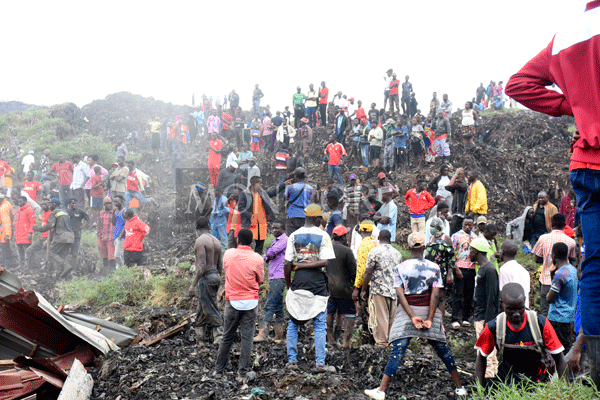KCCA readies Ddundu for waste-to-energy plant

Residents gathered at Kiteezi landfill where a heap of garbage fell on houses and livestock on August 10, 2024. PHOTOS/ ISAAC KASAMANI
What you need to know:
- Mr Barirega Akankwasah, the executive director for the National Environmental Management Authority, said waste can be managed when sorted at source to do many things, including being turned into energy, animal feeds, fertilizers, and doing many more things.
In only a matter of months, Kampala Capital City Authority (KCCA) says it will turn Ddundu dumpsite in Mukono into a waste-to-energy recycling plant.
KCCA deputy executive director David Luyimbazi told this newspaper yesterday that Ddundu is not going to be a normal landfill.
“It is going to be a waste-to-energy [recycling] plant. It is one place where garbage is going to be processed and turned into energy, briquettes, fertilizers, manure, and name it; basically for recycling waste,’’ he said in an interview.
“We have two investors ready and are doing their case studies right now. One has finished, the other is yet to start; but we are looking to establish a factory before the end of year,’’ Mr Luyimbazi added.
A huge waste dump hill at Kiteezi, in Kasangati Town Council, Wakiso District, which served Kampala City and neighbouring municipalities, collapsed on August 10. The disaster claimed 35 lives, with more than 14 victims rescued and 28 feared buried under the garbage sludge, with properties worth millions lost.
Kampala City alone generates about 2,500 tonnes of garbage. It acquired 135 acres of land to serve as the greater Kampala garbage-dumping site and landfill. But residents in the area recently protested against plans by KCCA to start dumping waste at the site without plans of better management.
Mr Abdallah Kayondo, the Member of Parliament for Mukono North, where Ddundu falls, warned that KCCA should first demonstrate the methodology they plan to use at the Ddundu plant to turn waste into energy.
“We asked for the impact assessment report and they refused to disclose until we had to take them to court. As we talk now, we have a case against KCCA and the National Environmental Management Authority (Nema),” he said.
Mr Anthony Wolimbwa, the National Coordinator Climate Action Network Uganda (CNNU), said the whole value chain of waste management in Uganda should be changed, terming it very old.
“From the environmental point of view, the way we are managing waste in Uganda is very old and not sustainable because the whole value chain of waste management should be checked from source,’’ Mr Wolimbwa warned.
He added: “Once the management at source is poor; from collection, storage and sorting, whether in office or at home, all the problems start from there.’’
Mr Wolimbwa said there would not be need for a dumpsite once the garbage is sorted and transformed into manure, with the recycling plants picking up the different waste. He said with the help from the private sector, the wastes can be renewed into briquettes, fertilisers and pavers.
He added that the solution would be to integrate two things at the same dumping site; one being management of waste at source and converting the waste into energy.
“So, those would be solutions that would require financing as opposed to getting another area [outside Kiteezi] that would be a short-term solution,” he said.
Mr Barirega Akankwasah, the executive director for the National Environmental Management Authority, said waste can be managed when sorted at source to do many things, including being turned into energy, animal feeds, fertilizers, and doing many more things.



